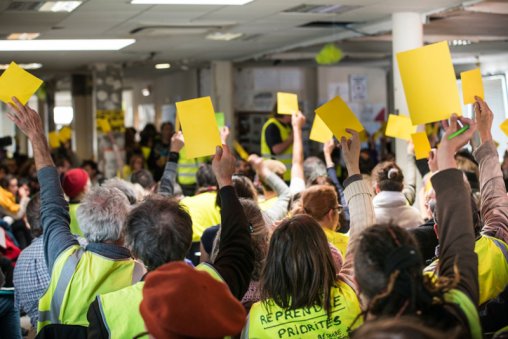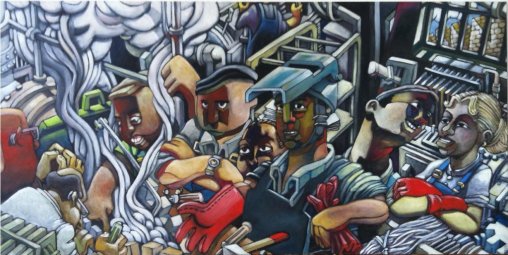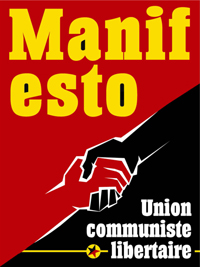 For a Libertarian Communism
For a Libertarian Communism
Unlike predatory capitalism, incapable of stopping its destructive headlong rush for the planet, libertarian communism can achieve a balance between productive capacities, the needs of the population and the capacities of the biosphere.
We propose a society project based on the practical experiences of the struggling workers, in both revolutionary and non revolutionary periods : reclaimed and self-managed factories, free communes, labour councils, socialized industries, agricultural communities, federations...
This project is called Libertarian Communism, not in reference to the Marxist-Leninist branch of « communism », but rather following on from an older and larger branch at the intersection of anarchism, syndicalism, council communism, and anti-authoritarianism.
By communism, we mean that the means of production are put in common, no longer under private ownership, but decentralized, that is to say without a state or social classes and with all ressources allocated according to the needs of one another.
By libertarian, we mean a society that necessarily allows emancipation for each individual that is part of it, favoured by economical and social equality and by a federalist and self-managed democracy.
Libertarian communism is a project for a society in constant evolution, driven by a permanent revolutionary process, which will gradually spread over the surface of the planet, thus earning and integrating the whole of the population.
Unlike predatory capitalism, incapable of escaping from its own destructive spiral, libertarian communism can achieve balance between productive capacities, needs of the population, and the capacities of the biosphere.
Here we indicate the main lines of this project as we can conceive it in its primary phase of construction ; that is, considering a large part of the population has yet to be convinced, that the revolution still has many inner and outer enemies, and that we still have no other choice than dealing with Capitalism and its legacy in terms of technologies in use, town and country layout, and social inequalities.
Self managed relations of production
The communism we defend rests on three inseparable pillars : socialized means of production, self- management of each work unit, democratically planned production.
• Socializing the means of production implies that they are a social property, a common asset for the whole of society, placed under the responsibility of both the industrial federations (metalworking, building, agricultural and food industries...) and of the different territorial agglomerations (municipalities, regions, federations...). A large council constituted by delegates, representing the workers of the various production sites, coordinates each industrial federation. Thus affiliated to an industrial federation, no production site has an interest in competing with another, as the mechanisms of free market would necessarily encourage : on the contrary, production sites have everything to gain from cooperating with one another and dividing production in a complementary manner.
• Self-management means power to the workers’ assemblies for decision making, with total freedom of speech and democratic voting. Self-management must break the dividing line between the leaders and the led, put an end to the social ranking of trades, and more generally to their division into sectors.
With self-management, supervisors, delegates, coordinators, controlled by an imperative mandate, are all elected and revocable by based held assemblies in charge of elabourating the key points of future work organization.
Overthrowing the relations of production implies a radical transformation in the nature of labour. Manual and intellectual activities, seen as distinct in our capitalist system, will be reunified : each worker must have the possibility of getting involved in the whole production process, from start to finish, by taking part in both the conception and the decision making. Working time includes moments of decision, execution, and in-service training. By employing all the unemployed and suppressing all useless tasks, such a reorganizing of work promises a massive redistribution, and therefore reduction, of individual working time.
With work no longer being alienating, the whole productive system is entirely remodelled, along with the role of technologies : by locally building production sites for easier self management on a human scale and by using technological innovation not to intensify exploitation but rather to serve labour collectives according to their needs.
• Democratic planification means that production is no longer driven by the quest for profit, but by the needs of the population. Economically speaking, use value takes over market value. Nevertheless, it won’t ever be possible to objectively quantify human needs : always will they depend on cultural factors, individual aspirations and what is materially / physically available.
Thus, from the diversity of needs springs the necessity of a large planification mechanism, conjointly with a trading system for goods and services, at the initiative of both individuals and communities.
The goal of planification is to make an inventory of needs and incentivize production towards the satisfaction of the most basic ones, respecting all ecological requirements (housing, food, healthcare, transports, education...) in doing so. In a non competitive and non contradictory way, the trading system must give to everyone access to complementary shops and services.

A federalist and direct democracy
There is a radical difference between a parliamentary state and a self-managed federation : inversion of power, democratic choice of the person in charge of coordinating and usual managing, but power delegation is not tolerated for crucial decisions. It is what we call direct democracy.
Direct democracy is based on three points : federation of territories, popular assemblies, imperative mandate (linked to the self managed structures composing the work units).
• a Federation of territories implies that society is structured around municipalities and then regions, scales that are the most easily controlled by the population.
Newly federated regions will not necessarily reproduce the current territorial dividing. The important point is that all new regions achieve agricultural and industrial productive autonomy, in order to enable and promote local distribution networks as much as possible.
Libertarian communism’s goal is a universal federation of regions, beyond language frontiers. A federation which provides itself with a set of common rules guaranteeing protection for each individual and community. Federalism prevents us from two pitfalls : bureaucratic centralism on the one hand, and destructuration of society on the other. It is balance between initiative and autonomy of the federated territories, links people through solidarity ; it mutualizes resources, provides interregional public services ; it is a free of hierarchy mutual dependence where the decisions and orientations for our society are collectively taken and followed by everyone. Federalism implies an open conception of society as the ideal framework for coexistence between general and particular interest, without ever fading one into the other.
• People’s assemblies are the reference unit for democratic debate. Far from implying constant meetings and perpetual debating over every single detail of the city’s life (indeed they can only bring together a given number of people in a given amount of time), they provide the framework for discussing greater projects. They are the first democratic step before formal consulting of the population, at all relevant scales, for final settling over the important political stances under debate.
It is also in these people’s assemblies that the delegates who form the councils of the municipalities, the regions and the federation are mandated and, possibly, revocated.
Direct democracy allows freedom of speech and freedom of organization, freedom of cult and freedom of press. Different schools of thought or different groups of people sharing common points of view can come together to fuel the debate beforehand, but delegates are always mandated collectively and, once appointed, they must apply the collective decisions and not that of their own tendency.
• Imperative mandating is a way of controlling from the base appointed delegates to the different democratic councils (from municipalities to the federation). Based on their integrity and their competences, and not on a political program or mere promises, they are chosen to coordinate the implementation of previously made collective decisions. Thanks to the imperative mandate, they are revocable at any time and although the main line of the position they are appointed to hold remains fairly strict, their stances are permitted to evolve according to arguments defended by others.
Self managed federalist democracy represents a radically different and new form of collective empowerment, breaking with the existing separation between the rulers and the ruled, between the state and society, and putting an end to all social class systems. Each person being part of this collective power, governing as such finds its place back down into the workshops and communes : society is self-governed, thus answering the self-management of production.
A self defending society
Such a new society will necessarily encounter internal and external enemies which it must defend itself from. Revolutionaries can therefore not get around putting self-defence methods in place.
At least in the first phase of the revolution, the persistence of societal ills — racist, homophobic, sexist violence, environmental depredations and crimes — compels us to deeply think about putting in place an emancipatory law and rehabilitative and restorative justice system.
However, the self-defense and justice structures of society will have to be closely linked to the
population and controlled by the councils, completely leaving behind the repressive organs of the old society.
The risks of militarization or police order are obvious in a revolutionary period and require acute vigilance. The goal of libertarian communism is a society free of military and police control.








